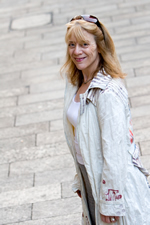Made in Italy – A day at the opera
MMus singer Lizzie Rogers tells us about the first event of our Italian weekend, which kicked off with a visit from the Welsh National Opera education team. In preparation for their upcoming tour to Southampton, WNO treated us to a lunchtime concert and afternoon workshop for our undergraduate and postgraduate vocal department – with singer, actress and vocal coach extraordinaire Mary King:
Mary King is a renowned and prolific opera singer, who has run workshops for all levels of singer, and her teaching experience ranges geographically from Europe to the USA, Australia, Argentina, and Amsterdam. Aside from opera experience, Mary has also been involved in West End coaching and pioneering music education workshops in prisons, as well as a publishing The Singers Handbook: A Guide for Aspiring Singers.

It comes as no surprise, then, that her workshop was so highly anticipated by both students and staff. Having been inspired by the lunchtime performance of Welsh National Opera members singer Georgina Kellen and pianist-repetiteur Rhiannon Pritchard, the vocal department plus other interested parties stayed seated, until the students were called forward to contribute. The afternoon began with a series of warm ups that acted as a confidence-building exercise as well as a vocal preparation, focusing on the improvement of diction, multitasking and resonance. Mary King quickly established herself as not only an experienced teacher, but also a pleasant one, full of fun and interest. I particularly enjoyed the way she would sing a sustained and particularly high note to draw everyone’s attention back from the chaos of moving, singing, concentrating and laughing students, in order to continue the task at hand.
The second half of the workshop was dedicated to solo work: a selection of students performed prepared repertoire before the class and received tuition on how to improve and hone their existing skills. Performing an Italian aria before your peers and receiving public feedback requires a certain amount of fortitude, and each singer rose to the occasion despite any nervousness they may have felt. As I looked about the hall I could see onlookers who were so deeply immersed in the high quality of the performances that there were a few tearful eyes by the end.
Once the solo performances were complete, Mary King approached each student with a delicate balance between critique and support. She explained to the audience how everyone has a different set of problems to overcome, completely individual to the singer. Whilst working to eliminate these ‘tics’, she encouraged a great amount of interaction, often asking the audience to stand and take part in the soloists’ exercises, particularly if they would make any one individual uncomfortable. During a twenty-minute break the soloists were set the task of finding all nouns and verbs in their repertoire as well as knowing the exact pronunciation of each word, and both students and staff gathered together to help them in their research.
Finally, each soloist performed one last time, accompanied on stage by Mary King. Although directed to the soloist, many of her instructions could be applied to other singers, and onlookers gained a more informed understanding of the voice and how best to overcome technical difficulties. Performers earned a sense of accomplishment, as well as a greater understanding of their instrument and how it works.
It was a useful and enjoyable afternoon for all who attended. I’m sure I’m not alone in hoping to repeat the experience!
